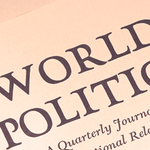Towards a more comprehensive understanding of conflict-related sexual violence
The way we talk about victims of sexual violence has changed. So should the interventions, argues Carlo Koos, senior researcher at CMI.

Nadia Murad, a former IS sex slave, entered the international stage with agency confidence and dignity. She became a symbol of survivors’ resilience. Murad inspired a shift in the way we talk about people who have been subject to sexual violence, from victims to survivors. Her work won her, alongside Dennis Mukwege, the Nobel peace prize in 2018 .
Socially active despite the stigma
Carlo Koos, who recently joined CMI as a senior researcher, has done extensive research on sexual violence in some of the most conflict-ridden countries in the world. He finds that survivors of sexual violence and their families show more pro-social behaviour than others in their community across a number of social indicators.
-Do they feel stigmatized? Yes, very much so, but that does not appear to prevent them from being more socially active, says Koos.
In most countries, rape is a game-changer that destroys reputations and lives. Women and girls are considered “unpure”. Men and boys are emasculated. Suffering detrimental consequences, how do survivors manage to get through it all? Which mechanisms enable them to fight against stigma and isolation?
This is currently an emerging research area and scholars are not a 100 percent sure, but the post traumatic growth theory postulates that people who have been through trauma like fatal illness, natural disasters or violence start valuing social relationships more. Yet, sexual violence during conflict is so brutal that the coping mechanisms might not be comparable. Rather than post traumatic growth, the pro-social behaviour could be the result of social compensation. In the face of social stigma and isolation, the survivors fight back on the social level.
Rape triggers stigma and social isolation, but survivors counter the stigma by compensating on a whole array of arenas and activities, not only in women’s rights groups or advocacy. Survivors of sexual violence are more active in farmers’ groups, in educational efforts and in other forms of pro-social behaviour; they are more likely to vote, and to donate money to the common good. In a survey done in the Democratic Republic of Congo, people who participated were compensated and asked if they would like to donate some of the money they received to a local school project. Not only were survivors of sexual violence and their families far more likely to donate, they donated more.
Targeted approaches based on evidence
The 2018 Nobel Peace Prize, the 2014 global summit on sexual violence during conflict, and a donor focus and international resolutions like article 1325 have undoubtedly contributed to more attention towards sexual violence during conflict. With attention comes funding.
It is critical that empirical research informs policy to ensure interventions that work. Koos argues that humanitarians, NGOs and journalists currently have a tendency to report on and talk about sexual violence during conflict in a standardized manner. For too long, the public discourse and development interventions have focused on vulnerability rather than agency. Responses have been on an individual level, even though research shows that responses on a community level are even more efficient.
-We need to ask ourselves if we are targeting the right people and using the right interventions. We need to support local agency and find ways to build on and strengthen resilience.
Research on sexual violence has mostly relied on qualitative methods. Koos has a quantitative approach, and hopes that the combination of qualitative and quantitative research can complement each other to give more effective and sustainable policy advice that responds better to the needs of the survivors and communities at large.
-We need a more comprehensive understanding. Our responses to the survivors should be based on real needs and not on biased evidence, says Koos.
Name: Carlo Koos
Discipline: Political scientist
Research interests: Conflict-related sexual violence, gender norms, gender norms in relation to peace, conflict and development, humanitarianism
Geographic orientation: Liberia, the DR Congo, South Sudan, Burundi and Nigeria
- Humanitarianism
- Rights and Legal Institutions
- Gender
- Democratic Republic of Congo
- Sierra Leone
- Sexual violence
- Conflict-related sexual violence
Publications
